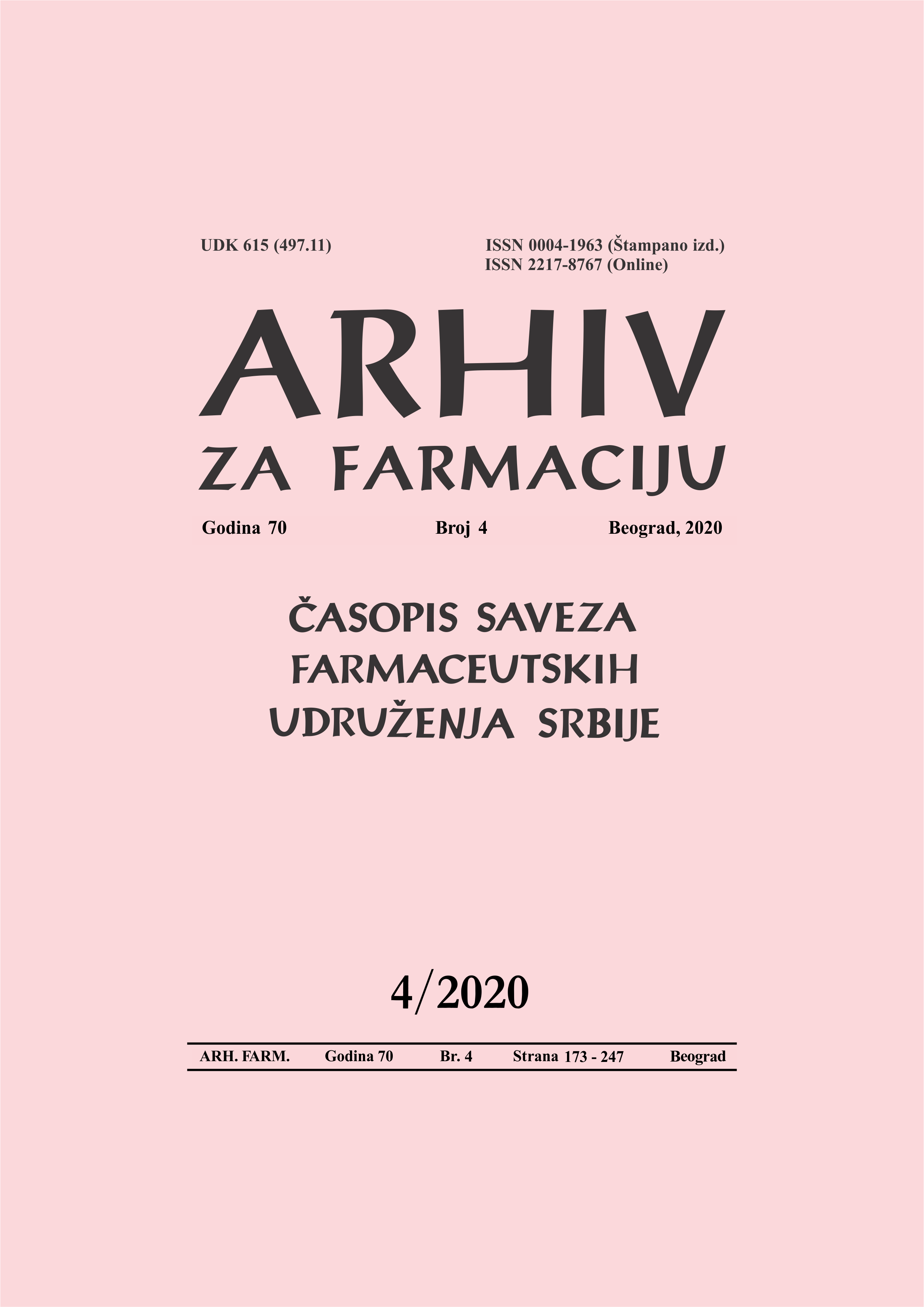Periconceptional folic acid (FA) supplementation among pregnant women in Bosnia and Herzegovina: a cross-sectional study
Abstract
Folic acid (FA) supplementation is recommended for all women of childbearing age and pregnant women. Still, women’s adherence to these recommendations is often low. This cross-sectional survey aimed to assess FA supplementation among pregnant women in Bosnia and Herzegovina (BiH) since no such data exist to date. Data were collected by a voluntary, anonymous, self-administered internet-based questionnaire. The inclusion criteria were current pregnancy, BiH origin, and BiH residence for at least the past 5 years. The vast majority (82.1%) of women reported inadequate periconceptional FA supplementation, and only 26.9% reported supplementation during the critical period for neural tube closure. The use of a high dose (≥5 mg/day) FA beyond the first trimester was reported by 9.0% of women. Women’s age was significantly associated with adequate folic acid use for the prevention of neural tube defects (OR=1.207, p<0.05). The periconceptional FA supplementation in the studied population is suboptimal. These preliminary data call for action, especially because BiH is a lower-middle-income country without mandatory FA food fortification program. Further research on folate dietary intake and folate status in the target group, as well as possible predictors of the low prevalence of supplementation, is recommended.
References
Martiniak Y, Heuer T, Hoffmann I. Intake of dietary folate and folic acid in Germany based on different scenarios for food fortification with folic acid. Eur J Nutr. 2014;54(7): 1045–1054.
Bailey LB, Berry RJ. Folic acid supplementation and the occurrence of congenital heart defects, orofacial clefts, multiple births, and miscarriage. Am J Clin Nutr. 2005; 81(Suppl. 5):1213S–1217S.
Greene ND, Copp AJ. Neural tube defects. Annu Rev Neurosci. 2014;37:221–242.
Hodgetts VA, Morris RK, Francis A, Gardosi J, Ismail KM. Effectiveness of folic acid supplementation in pregnancy on reducing the risk of small-for-gestational age neonates: a population study, systematic review and meta-analysis. BJOG 2015;122(4):478-490.
Chrysanthopoulou E, Karampela I, Diakaki C, Theodorakopoulou M, Armaganidis A. (2018) Mandatory folic acid food fortification to prevent neural tube defects: The pro or con debate. Am J Intern Med. 2018;6(4):66-72.
Crider KS, Bailey LB, Berry RJ. Folic acid food fortification-its history, effect, concerns, and future directions. Nutrients. 2011;3(3):370–384.
Rosenthal J, Casas J, Taren D, Alverson CJ, Flores A, Frias J. Neural tube defects in Latin America and the impact of fortification: a literature review. Public Health Nutr. 2013;17(3):537–550.
Garrette GS, Bailey LB. A public health approach for preventing neural tube defects: folic acid fortification and beyond. Ann NY Acad Sci. 2018;1414(1):47-58.
World Health Organization (2016) WHO Recommendations on antenatal care for a positive pregnancy experience. Geneva: WHO. Available from: https://www.who.int/reproductivehealth/publications/maternal_perinatal_health/anc-positive-pregnancy-experience/en/
US Preventive Services Task Force. Folic acid supplementation for the prevention of neural tube defects: US Preventive Services Task Force Recommendation Statement. JAMA 2017;317(2):183–189.
Working Group on Best Practice in Maternal–Fetal Medicine International Federation of Gynecology and Obstetrics (FIGO). Best practice in maternal–fetal medicine. Int J Gynecol Obstet. 2015;128(1):80-82.
American College of Obstetricians and Gynecologists. ACOG Committee Opinion Number 762: Prepregnancy counseling. Obstet Gynecol. 2019;133(1): e78-e89.
Amitai Y, Koren G. The folic acid rescue strategy high-dose folic acid supplementation in early pregnancy. JAMA Pediatr. 205;169(12):1083-1084.
Dolin CD, Deierlein AL, Evans MI. Folic acid supplementation to prevent recurrent neural tube defects: 4 milligrams is too much. Fetal Diagn Ther. 2018;44(3):161-165.
Toivonen KI, Lacroix E, Flynn M, Ronksley PE, Oinonen KA, Metcalfe A, et al. Folic acid supplementation during the preconception period: A systematic review and meta-analysis. Prev Med. 2018;114:1-17.
Botto LD, Moore CA, Khoury MJ, Erickson JD. Neural-tube defects. N Engl J Med. 1999;341(20):1509–1519.
Vitale K, Sović S, Milić M, Balorda Lj, Todorović G, Uhoda B. What Zadar county parturient women know of folic acid and how much they use it. Med Jad. 2011; 41(3-4):95-103.
Nilsen RM, Leoncini E, Gastaldi P, Allegri V, Agostino R, Faravelli F et al. Prevalence and determinants of preconception folic acid use: an Italian multicenter survey. Ital J Pediatr. doi: 10.1186/s13052-016-0278-z.
Navarrete-Muñoz EM, Valera-Gran D, García de la Hera M, Gimenez-Monzo D, Morales E, Julvez J, et al. Use of high doses of folic acid supplements in pregnant women in Spain: an INMA cohort study. BMJ Open. 2015;5(11):e009202. doi: 10.1136/bmjopen-2015-009202.
Obeid R, Schön C, Wilhelm M, Pietrzik K, Pilz S. The effectiveness of daily supplementation with 400 or 800 µg/day folate in reaching protective red blood folate concentrations in non pregnant women: a randomized trial. Eur J Nutr. 2018;57(5):1771–1780.
Gicevic S, Gaskins AJ, Fung TT, Rosner B, Sabanovic E, Gurinovic M, et al. Fueling an epidemic of non-communicable disease in the Balkans: a nutritional survey of Bosnian adults. Int J Public Health. 2019;64(6):873-885.
Wang S, Ge S , Zhu B, Xuan Y, Huang K, Rutayisire E, et al. Maternal continuing folic acid supplementation after the first trimester of pregnancy increased the risk of large-for-gestational-age birth: A population-based birth cohort study. Nutrients. 2016;8(8):493. doi:10.3390/nu8080493.
Zhu B, Ge X, Huang K, Mao L, Yan S, Xu Y, et al. Folic acid supplements intake in early pregnancy increases risk of gestational diabetes mellitus: evidence from a prospective cohort study. Diabetes Care. 2016;39(3):e36-7. doi:10.2337/dc15-2389.
Zetstra-van der Woude PA, De Walle HEK, Hoek A, Bos HJ, Boezen HM, Koppelman GH, et al. Maternal high‐dose folic acid during pregnancy and asthma medication in the offspring. Pharmacoepidemiol Drug Saf 2014;23(10):1059-1065.
Wang T, Zhang HP, Zhang X, Liang ZA, Ji YL, Wang G. Is folate status a risk factor for asthma or other allergic diseases? Allergy Asthma Immunol Res. 2015;7(6):538-546.
McStay CL, Prescott SL, Bower, Palmer DJ. Maternal folic acid supplementation during pregnancy and childhood allergic disease outcomes: A question of timing? Nutrients. 2017;9(2):123. doi:10.3390/nu9020123.
Wiens D, DeSoto MC. Is high folic acid intake a risk factor for autism?—A Review. Brain Sci. 2017;7(11):149. doi:10.3390/brainsci7110149.
Bailey SW, Ayling JE. The pharmacokinetic advantage of 5-methyltetrahydrofolate for minimization of the risk for birth defects. Sci Rep. 2018;8(1):4096. doi:10.1038/s41598-018-22191-2.
Yamamoto S, Wada Y. Awareness, use and information sources of folic acid supplementation to prevent neural tube defects in pregnant Japanese women. Public Health Nutr. 2018;21(4):732-739.

